‘The Straw That Broke the Camel’s Back’ – Defense Teams Explain their Withdrawal from the Hearings
A heated discussion took place during today’s hearings in front of the ECCC: background to this was Nuon Chea’s and Khieu Samphan’s defense teams’ withdrawal from the proceedings on Wednesday, for which they now gave explanations (for a detailed account on this day, see the last post). According to them, yesterday’s decision was one of the too many incidences where the trial chamber had not ruled correctly, which prompted them to leave the courtroom.
Accused Nuon Chea Addresses the Court
With a delay of almost twenty minutes, the hearing started. President Nil Nonn announced that they key document presentations would be heard in relation to three worksites: Kampong Chhnang Airport, 1st of January Dam, and Trapeang Thma Dam. After the defense team had left the hearing yesterday, the chamber needed to address this issue. He asked for the reasons of the boycott, starting with Nuon Chea defense counsel. Nuon Chea Defense Counsel Victor Koppe took the floor and requested half an hour uninterrupted speaking time to explain the context and rationale behind his decision. He also sought leave for Nuon Chea to speak. Mr. Nuon Chea then addressed the court:
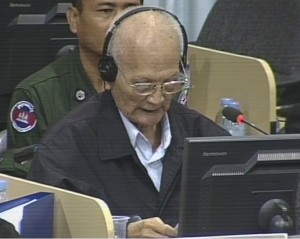
Co-Accused Nuon Chea
“Thank you Mr. President. Good morning honorable and national compatriots. Yesterday, my lawyers left the courtroom. It was not planned. They just couldn’t take anymore what was happening in the court room in an unjust way. It was the straw that broke the camel’s back. Mr. President, I want to make it clear now, I fully support the decision of my defense counsels to leave the courtroom yesterday. I believe and I am confident in what my defense team has been doing. The decision by the trial chamber yesterday is not acceptable. Yesterday it was the key document presentation hearing. It was the time that the parties are presenting documents to the public and everyone, particular documents which have something to do with what happened in the past. In contrary, the Co-Prosecutors presented to the judges the documents of Written Record of Interviews of witnesses. Mr. President, I have followed the proceedings very closely, and I observe that many witnesses do not speak the truth, and some other witnesses do not really truly say what happened. My lawyer stated already that many witnesses changed their testimonies when they’re before the chamber. And in addition, what has been stated in WRIs is contrary to what has been said here before the chamber. So if any witness wants to tell the cout, they should come here before the chamber and they should respond to questions put by my defense counsel. Today and yesterday was the key document presentation hearing, and it was not a hearing for party to present what witness said. Documents are very important for all of us. Yesterday the Co-Prosecution said that they did not have any documents to present. And my lawyers stated that they have almost 40 important documents to present to the court. However, in light of what happened yesterday, I told my defense counsel to present the documents whenever the Co-Prosecutors presented documents rather than reading from Written Records of Interviews. I would like to conclude my statement now, Mr. President.”
Mr. Nuon Chea then requested to follow the proceedings from the holding cell. Deputy Co-Prosecutor Mr. Smith took the floor, stating that before Nuon Chea would leave the room, he should be asked whether he instructed his counsel to not appear for the document hearings today. Nuon Chea had clarified before that he had adopted the decision yesterday, but it should be clarified for today. Mr. Victor Koppe replied that he had been instructed not to leave the room. He had also instructed the defense team not to hold the key document presentation, should yesterday’s decision not be reversed. “We’re not here to boycott the proceedings as you called it yesterday.”
Asked to clarify, Mr. Koppe stated that “as I just indicated, we’re not boycotting this trial. We walked away in anger yesterday. And I would very much like to explain why we did so. But the instruction is clear: we’re not boycotting this trial.” After conferring for a few minutes, the President granted Nuon Chea leave to be brought to the holding cell, where he could follow the proceedings through audiovisual means. A waiver of his right to participate needed to be submitted. Mr. Koppe then requested a short recess until Nuon Chea had settled himself in the holding cell. Moreover, he sought permission to speak for half an hour uninterruptedly. To this, Mr. Smith replied that he did not have an objection to Mr. Koppe explaining why he withdrew from the proceedings yesterday. However, he questioned why this would take half an hour and asked whether the defense counsel could be brief in explaining his reasons. The President announced that the request by Mr. Koppe was granted. However, it would be up to the discretion of the chamber whether he could do so uninterruptedly.
Explanations by Defense Counsel Victor Koppe
Mr. Koppe then started giving the explanation for his withdrawal yesterday. He first aimed at giving a broader context by going back to a decision of the 8th of February 2013.[1] In this Decision on the Co-Prosecutor’s Immediate Appeal Concerning The Trial Chamber’s Decision Concerning the Scope of Case 002/01, the Supreme Court Chamber had ruled that “it must also be considered at this stage that one trial panel alone may be unable to fulfill the ECCC’s obligation to conclude proceedings on the entirety of the charges in the indictment within a reasonable time. As such, in the event of a renewed severance of case 002, the Supreme Court considers that the ECCC should explore the establishment of another panel within the trial chamber […]”. Moreover, according to the decision, “the composition of a second trial panel would safeguard against any potential concerns about actual or appearance of bias of judges from the first trial adjudicating the second trial.”
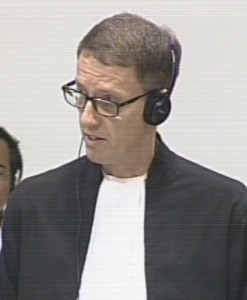
Nuon Chea Defense Counsel Victor Koppe
Thus, not only expedience, but also the “fear that you would not be impartial after having rendered the judgment in the first trial”, were reasons for suggesting the establishment of a second panel. “The trial chamber chose to ignore this advice.” The judgment of August 2014 “was a total shock to our client Nuon Chea.” This was “not only because of its poor quality”, having identified a total of 223 grounds of appeal, but also because of the way it was formulated. “It was clear to us that the Supreme Court Chamber had been right in that it was possible that Nuon Chea could have had a second trial with the same judges that would also be fair.” This is why, according to Mr. Koppe, the defense had filed a motion for disqualification. “One of the things we said was that you, Judge Lavergne, had made cowardly decisions and lacked judicial integrity. Judge Fenz, we didn’t ask for your disqualification, but I’m regretting this decision to do this very much.” Further, “compared to what we have experienced in the second trial, Judge Cartwright was indeed a shiny and bright beacon of impartiality.”
Mr. Smith took the floor, stating that going through all the decisions and applications was not necessary and too lengthy. These arguments had been put forward in the disqualification application already. “If he doesn’t feel, or his client doesn’t feel, like he is getting a fair trial, generally, why doesn’t he just say that?” Mr. Koppe replied that “this is exactly what I expected to happen” and that this was the reason for his asking for being able to talk for thirty minutes. The president stated that the chamber had already ruled upon this matter and did not want to hear issues related to this. With regards to the decision E163/5/13, this had already been decided upon. “The trial chamber has followed the decision and today we have not received any application for annulment. The court does not have the necessary resources to establish the second panel.”
Thus, the President said, the reason for Koppe’s withdrawal was not related to this. The President concluded that the withdrawal was related “solely on the issue of presentation of documents.” The explanation should therefore relate to the presentation of documents. “We have the discretion to intervene. […] Yesterday, it cost the court a lot to delay the proceedings.” This prompted Mr. Koppe to reply that “It is indeed true that it is your prerogative to shut me up. And it is my prerogative not to say a word anymore. So it’s take it or leave it. Or nothing.” Judge Lavergne took up his word and stated that Mr. Koppe should give specific reasons for his behavior yesterday. “I think it is our right to listen to you.” As regards the disqualification motion, “this no longer concerns us today.” Next, Mr. Son Arun took the floor, explaining that yesterday’s decision to withdraw was spontaneous and not under instructions of his client. However, “As a team member and a partner with [Mr. Koppe], I decided to leave.” He also needed to discuss with his clients. According to Mr. Arun, his client supported the behavior of his defense team. Judge Lavergne stated that the chamber was still awaiting explanations on legal grounds. To this, Mr. Koppe said “I was giving you my reasons, but you don’t want to listen” Judge Lavergne stated that this was not true, since the chamber was asking for reasons to object to documents by the Co-Prosecution that had already been declared inadmissible. “If you don’t want to provide any explanations, then we consider that there are no valid explanations.” Mr. Koppe replied that “To be honest, Judge Lavergne, I don’t really care what you think. You either give me time to express my reasons, or you don’t.”
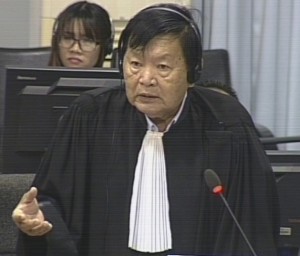
Nuon Chea Defense Counsel Son Arun
Asked to clarify whether he had consulted his client beforehand, Mr. Arun replied that he had not discussed with his client first. With regards to legal grounds, Mr. Arun stated that “I share the views of my client.” The defense team had been unhappy for a long time, and this culminated yesterday. Thus, he followed Mr. Koppe without legal grounds to discuss with his partner.
At this point, Mr. Smith took the floor and referred to Mr. Koppe’s remark that he did not care what Judge Lavergne thought. He stated that in his view it is not “acceptable for barristers in front of this court to speak to judges in that manner. I think it demeans the proceedings.” Mr. Smith then proceeded to ask the chamber to consider warning Mr. Koppe under rule 38 by stating that his “conduct is offensive or abusive to a judge.” He should be warned that “this is not the standard in which we treat judges in this court.” Mr. Koppe replied “I would like to read to you what I had actually written down as my last words. Because I knew, or predicted, that this might be coming. What I wanted to say is that the walking-out yesterday from court was indeed without any legal justification. In a common law court it might have been considered as contempt of court. But we aren’t in a common law court, but if we were and if I were charged with contempt of court, I would have happily pleaded guilty. I have indeed nothing but professional contempt for the international judges of this trial.” Mr. Smith again asked to the Defense counsel under Rule 38 to refrain from using such language towards the bench.
Accused Khieu Samphan Speaks
Next, Khieu Samphan addressed the court.
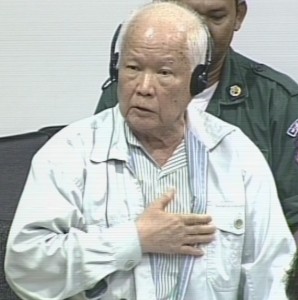
Co-Accused Khieu Samphan
“Thank you, Mr. President. Good morning your honors and everyone here. Good morning all compatriots. First of all, I would like to inform that I fully support the two Co-Lawyers who withdrew themselves yesterday from the courtroom. They received instructions from me. I gave the instruction to my lawyers that I am not happy. I am not satisfied that the Trial Chamber has been, has not been neutral. And it will be time that I instruct my lawyers to express my unhappiness and my unsatisfaction. It is now the straw that broke the camel’s back. I would like to add further on this point: I told the court at the beginning of the trial 002/002, I told the court already I lost trust in the Trial Chamber to find justice for me. It is because your honors has already convicted me life sentences. So how could you provide any justice for me? And I have observed that it is clear for all of us, the fact reflects what has been happening. Yesterday I could say it was the straw that broke the camel’s back. There’s another point I would like to address before the chamber now. I actually instructed my Co-Lawyers to be here to present in the courtroom today. However, I instructed my lawyer not to present any relevant documents. This is my position, this is my submission. And now I would like to seek the floor for my Co-Lawyers to present any further details.”
Defense Counsel Arthur Vercken gives his Explanation
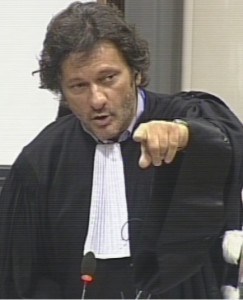
Khieu Samphan Defense Counsel Arthur Vercken
Mr. Arthur Vercken took the floor, stating that the “on the side of the Prosecution and the chamber to examine the last straw”, which is “not worth anything. There are many others, hundreds others, and the situation is such that today we cannot believe that the chamber cannot stick to what it had ruled in decision E318 of October 2013.” In this decision, the chamber had made a “promise that you cannot meet”: the trial chamber would not be bound by the findings found in the first trial. According to Mr. Vercken, it is not possible to rule fairly when the two accused had already been sentenced to life sentence in the first part of the trial with a claim that this can be done independently. “That is the last straw that has broken the camel’s back.” Thus, “since the beginning of this second trial, we have Co-Prosecutors who are manipulating you, who are manipulating us.” Being in a civil criminal process, “the evidence presented to you is limited. It is well-defined, well-circumscribed. You cannot change it unless under very specific circumstances.” It should be prohibited that the Co-Prosecutor is using information that is inculpatory from cases 003 and 004.
According to Mr. Vercken, this practice had been prohibited by a memorandum of January 24 2012. In this decision, the judges referred to Rule 53(4) to state that an obligation exists for the Co-Prosecution to disclose all documents in their possession that would enable the chamber to reach a finding of guilt of an accused, to attenuate their guilt, or to “rule on their reliability[2].” According to Mr. Vercken, the Co-Prosecutors had brought 1355 witness statements to the trial, drawn from cases 003 and 004, stating that “the trial chamber has indicated that the obligation to disclose relevant documents, whether for inculpatory or exculpatory reasons, is an obligation that is incumbent on the trial chamber and the accused.” This led Mr. Vercken to ask “who you’re making a mockery of? Of us, or of you? Of course of you and your decisions. It’s a mockery of law, a mockery of the rules.”
Further, Mr. Vercken stated that they could not have reacted to the documents on time in light of the great number of documents that were filed by the Co-Prosecution without distinction of exculpatory or inculpatory evidence. The defense had prepared a motion to reject the “use of all those documents which are very questionable” and which the trial chamber had prohibited, in the view of Mr. Vercken, because they are inculpatory. This motion was written to prohibited to us the documents, even of those 149 documents that had been declared admissible, since they were inculpatory. He further stated that the Prosecutor’s wish to use 18 of those documents was “abnormal” and “nor acceptable.” In light of the time pressure, the defense had filed a motion. Since the motion had to be translated, they had forwarded it as a courtesy copy. However, “it had happened in the past” that they had convened hearings despite the motions having been only available in one language. “This is of capital importance. It is a matter of finding out whether this trial 002/002 is also case 003 or 004. Because if that is the case, we can no longer do anything, we can no longer defend our client.” According to Mr. Vercken, this was the legal reason why they had left the courtroom yesterday. “It is abnormal. You cannot accept this from the Prosecutor.
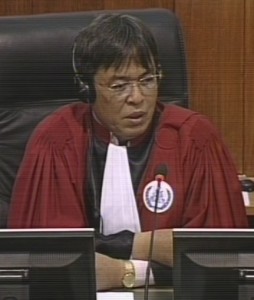
President Nil Nonn
Turning to another issue, Mr. Vercken indicated that he had not been giving enough time to express his opinion yesterday: “The fact that we are being deprived of the right to speak. I understand that there are cultural differences – I don’t know whether this is customary in Cambodia to abruptly prevent lawyers from talking, to deprive them of their microphone.” In his view, this was not practice in international courts, “and I have been working in this arena for the past ten years.” Quite obviously, he went on, “everyone is losing control. […] . And we see the reaction of some of you, which is quite excessive. It is human. And for me, it is part of the process.” This would highlight, he said, that “the chamber, with all due respect, is humanely unable to conduct this second trial in a fair manner, quite simple because you have sentenced the accused to life imprisonment.” Thus, he requested a second bench to try the accused. He then added that he was dissatisfied with the fact that he had sent an e-mail on Tuesday evening and received no reaction on it by the chamber Wednesday morning. To this, the President replied that the court had addressed the issue and they had decided not to hear two of the documents in question (for more information, see blog entry from Wednesday, August 26th). They had to adhere to rule 78(3) and (4).
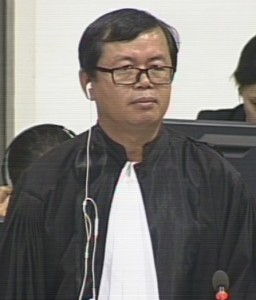
Khieu Samphan Defense Counsel Kong Sam Onn
The floor was then given to Mr. Kong Sam Onn. He explained that his reason for the withdrawal on Wednesday was that he acted in a team. He further stated that with regards to the second objection Mr. Koppe made the day before, the ruling of the President had not been clear. In his view, the Written Records of Interviews of deceased witnesses were seen as key documents by the President. Later, there was a ruling by the President that any documents could be considered key documents. “I do not really understand what key documents are. If we cannot determine the definition of key documents, how can we continue to present key documents?” In this proceedings, “we have no to challenge, to debate the evidence”, which is why the “hearings yesterday and today are considered to be final submissions.” Because of these reasons, the defense lawyers withdrew. Mr. Vercken took the floor to clarify that “for legal certainty, we are in a very abnormal situation”, referring to the ruling of the president that Written Records of Interviews could be used as long as they are deceased, and later stating that all of testimonies could be used, even if the person was still alive.
The President replied that as for deceased people, the objection was overruled.According to the President, he had mentioned any documents, such as the Written Records of Interviews of the deceased. He further noticed that the incident had first been caused by the counsel for Nuon Chea. “Now there are no legal grounds for the chamber concerning the matter”, and he had not heard any legal grounds from any defense counsel. Further, “we have done our utmost for the sake of justice. This is a clear approach that we have to follow. We cannot do whatever we want.” With this, the President gave the floor to the Co-Prosecutor.
Deputy Co-Prosecutor William Smith’s View
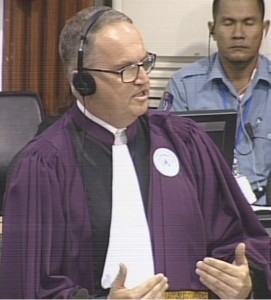
Deputy Co-Prosecutor William Smith
Deputy Co-Prosecutor William Smith presented his view on the matter. He stated that the walk-out seemed to have been a culmination of the defense’s frustration with a number of decisions in this process. Further, it seemed that Nuon Chea had been consulted whether they should withdraw from the proceedings, which was unclear as regards Khieu Samphan, it “looked like a spontaneous reaction.” In the future, the defense should ask for an adjournment so that they can speak to their clients beforehand to not lose a day. According to Mr. Smith, he had not heard any “real legal justification other than them being unhappy with the decision yesterday.” He then referred to a Decision of June 20 2012[3], which allowed parties to put forward submissions of Written Records of Interviews of witnesses “that would not necessarily appear before the court”. These could be admitted and taken into account, if they did not relate to acts and conducts of an accused. In Mr. Smith’s view, international practice allowed witness statements as corroborative evidence.
Moreover, leaving the courtroom was – according to Mr. Smith – “an unreasonable approach to take”, since court rooms are based on disputes. If a lawyer is dissatisfied with a decision, they could ask for reconsideration or they could appeal. Further, Khieu Samphan’s defense counsel’s position seemed inconsistent, since the only Written Records of Interviews they had objected to yesterday were the eighteen documents in question. These had been admitted under rule 87(4). Mr. Smith said that it “might have been oversight” and that the Khieu Samphan defense team did not realize that these documents had been admitted. Thus, the Khieu Samphan team had not objected to a number of other Written Records of Interviews, which related to Kampong Chhnang worksite, for example. Around twenty more of these documents had been on the lists for the other worksites. Thus, it seemed that the Khieu Samphan defense team had decided to take the objection further.
Furthermore, Mr. Vercken himself had used Written Records of Witnesses that have not and will likely not be heard in front of the court. In Mr. Smith’s view, this indicated a contradiction, since “they’re happy to use WRIs to challenge what other witnesses have said, but they don’t want the Prosecution to use this.” Referring to the defense’s claim that these proceedings not fair, Mr. Smith said that they equally had the opportunity to present Written Records of Interviews. “If they choose not to take it, it’s up to them.” As regards Khieu Samphan Defense Counsel’s question what a key document is, Mr. Smith replied that “if they don’t know, they should ask.” Parties have the right to decide this for themselves. To the Defense’s argument that reading excerpts of witness statements would be to present closing arguments, Mr. Smith said ht “this is simply not correct.”
In his view, the Prosecution was merely reading these excerpts as parts of evidence. As for the disclosure of the documents, Mr. Smith said that “all counsels would prefer not to have [cases 003 and 004] running in parallel”, and that exculpatory evidence had to be disclosed. However, it is difficult to determine the nature of evidence. “Any evidence that could affect the reliability of the evidence of the trial” is seen as exculpatory. For example, differing accounts on working hours or the number of people killed could affect the reliability of other statements. What is more, a party to the proceeding had the opportunity to another party’s filings. With regards to the eighteen admitted documents, “the defense did not file anything in response. Now, a few weeks later, they start complaining.”
Turning to his next point, Mr. Smith stated that what Mr. Vercken “to say is that they didn’t have an opportunity to be heard.” Other international tribunals also “run the hearings in an orderly manner” and therefore do not let anyone speak at whatever time they wish. If applications have been rejected, “it’s the lawyer’s obligation to move on.” To conclude, Mr. Smith stated that “if the frustration is so great that they can’t cope to work in this environment, they should say so and make the appropriate filings.” Thus, the withdrawal from the proceedings yesterday neither had any legal justifications, nor was it factually justified. At this point, Mr. Vercken suggested taking a break “so that the blood pressure [of his client] can calm down.”
Civil Party Lead-Co Lawyers React
After the break, the floor was given to the Civil Party Lead Co-Lawyers to respond. Civil Party Lead Co-Lawyers Marie Guiraud stated that she “was surprised by the violence of the statements by Counsel Koppe.” She first stated that a strong defense was also in the interest of civil parties, since this would render the judgment more meaningful. “Of course, they’re frustrated I this trial to no longer hear the defendants, but they still want to hear the parties” and understand the “fundamental role that the defense has to play in this trial”, according to Ms. Guiraud. She then proceeded to state she wanted to give a personal comment, stating that she does not see how they “want to continue coming every day and not to boycott if they have just insulted two major officers.” Further, she did not understand how they can “be continued to be paid by an institution that they hate.” Thus, the defense should either “consider the conditions to be adequate” or, if this would not be the case, the “only logical step to take in that case would be to leave”. Otherwise, “the straw that broke the camel’s back yesterday” would come back. Stating that she had also worked as a defense lawyer, Ms. Guiraud stressed the importance of the defense and stated that she considered that the rights of the defense were respected in this trial. Looking at the defense, she said “I see the defense is smiling”, and she sees “their frustration”. However, they still had to move ahead.
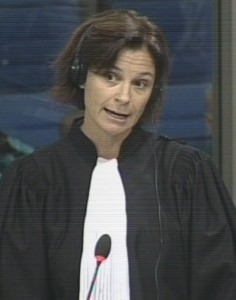
Civil Party Lead Co-Lawyer Marie Guiraud
She then referred to the death of Ieng Tirith, and stated that Civil Parties are also passing away. Around twenty Civil Parties had requested for their successors to take up their Civil Party applications. Thus, moving forward in the trial was important with the participation of the defense. Ms. Guiraud stated that, at least for the defense for Nuon Chea, it seems that frustrations stem from the fact that the procedural context of this trial are misunderstood by the Nuon Chea defense” . The nature of this trial was that there are several layers: preliminary investigations, a closing order, a case file and hearings. Thus, witnesses have a different role when being in the courtroom or when being interviewed. According to Ms. Guiraud, the “defense seems to not have understood the role of the investigators.” Before these hearings, the “defense could have done a lot”.
Ms. Guiraud alleged that they “maybe had not have understood the role of an appeal to the closing order.” Thus, the court officers may use the documents filed to form their convictions, even if the witnesses are not necessarily heard. With regards to yesterday, Ms. Guiraud clarified that the chamber had never said that Written Records of Interviews should be excluded. Thus, “we believe that Written Records of Interviews of witnesses or Civil Parties may be presented during the key document hearings.” In the course of these hearings, the defense could object. She pointed out that during the last key document hearings, she had used a Written Record of Interview[4] and had not faced the same reaction as the day before. In her view, “we’re going to be here for another year.” She then asked “how are we going to proceed with a frustrated defense? How are going to be able to proceed in the best conditions so that the straw that broke the camel’s back yesterday does not break the camel’s back tomorrow, the day after tomorrow, and in two weeks?”
Follow-up Questions
Judge Lavergne then sought clarification regarding two issues. First, as for the objections that were raised: did the defense teams object to the presentation of all Written Records of Interviews in the course of key document presentations, or only of those witnesses who are still alive, or of those who have been head in cases 003 and 004 and had been disclosed in this case? Second, as regards the difference between the common law and the civil law system: what are the specific provisions in French system that would forbid a chamber to put forward evidence that was not on the case file except exculpatory evidence? According to Judge Lavergne, the chamber had discretionary power with that allowed it to put forward evidence.
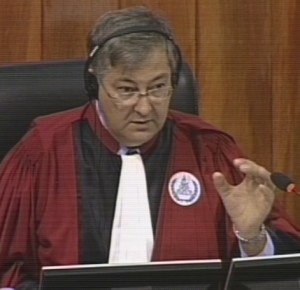
Judge Jean-Marc Lavergne
To this, Mr. Vercken replied that “I didn’t come here this morning to be questioned or to pass an exam.” However, he would be willing to provide a detailed explanation of the legal rules. Nevertheless, he went on, he would “first rely on common sense”. He criticitsed that the trial was “so multi-formed”. He stated that he understood the discretionary powers of the chamber. Howwever, he pointed out that this concerned “thousands of written statements that come from a different investigation in a different trial”, in which only Prosecutors can act and put questions forward. In his view, the Prosecution was “continue feeding the current case, where the production of evidence should have been finished.” Mr. Vercken rejected the argument of Mr. Smith that it is difficult to distinguish between exculpatory and inculpatory evidence: “This is a joke.” He further argued that “we, with our six people in our team, we […] will do the Prosecutor’s job?” by going through these thousands of documents in detail. In the first case, the Prosecution disclosed documents from case 003 and 004 only exceptionally. He alleged that this was because these cases were “politically threatened” of ever coming into place. Thus, the Prosecution would violate the rules in this case to save the others. “This is a blatant and absolute violation of the defense’s rights. […] What is happening here is completely abnormal [..]. The trial chamber has to tell the Prosecutor to stop.” He then reiterated that “This is a joke. Not only is this a joke, they’re making a mockery of you and your prior decisions.” Addressing the Civil Parties Lead Co-Lawyers, he stated that he was “tired of hearing that we’re frustrated”, since this was not a personal, but a legal issue here. After Mr. Vercken sat down, Judge Lavergne repeated his question which Written Records of Interviews the defense would object to. Mr. Vercken replied that they objected to all evidence that came from the investigations in cases 003 and 004. Judge Lavergne then asked for clarification by the defense team for Nuon Chea. Mr. Koppe answered that “our objection yesterday was very clear”: he objected to Written Records of Interviews in general in key document presentation hearings. He then referred to E315/1: “your own decision”, where the trial chamber had stated that “case 002/001 established a practice in holding key document presentation hearings, which provided the parties the opportunity to present key documents.”
Mr. Koppe then stressed the words document and documentary evidence, which he interpreted as including, for example, revolutionary flags and minutes of meetings, but not Written Records of Interviews. “That was our objection, and that was the straw.” Judge Lavergne asked to clarify whether had understood it correctly that the Nuon Chea Defense opposed the use of all Written Records of Interviews, since he believed that these are not documents in the meaning of the chamber. To this, Mr. Koppe replied “again, you don’t seem to understand what I’m saying.” He stated that the Co-Prosecution could “use whatever they want to” during the closing briefs, but not during key document presentation hearings. During the latter, they should use “pieces of paper, preferably contemporaneous, and if necessary, journal articles or academic scholarly work.” If there is not enough evidence, the Prosecution should not resort to read excerpts of Written Records of Interview. Mr. Vercken then added that key document hearings had always posed problems. He stated that the list of witnesses who wil appear before this chamber was still unknown. Mr. Vercken then said that key document hearings are supposed to take place at the end of one segment, but segments “being what they are, taking of the role of the accused, how do you understand that?” Mr. Vercken stated that in the hearings on Wednesday, Mr. de Wilde had actually given interpretation of a document.
The President took the floor and stated that the defense teams had failed to give reasons for their withdrawal on Wednesday, which is why the chamber listened to the reasons today. Some legal issues had been raised. The camber has reviewed the transcripts and noticed that there had been differences in the definition of key documents of the parties. “The chamber would discuss this matter and issue a memorandum. Thus, the President announced that the hearings were adjourned until Tuesday, 9 am. The testimony of the civil parties and witnesses for next week would be postponed and a renewed schedule sent. Hearings would also take place on Friday next week.
[1] E163/5/1/13, at 00885784 (ENG), 00885826 (KH), 00891313 (FR) [2] This might have been an error in translation, and should rather have been translated as responsibility. [3] E96/7 [4] E3/5519
